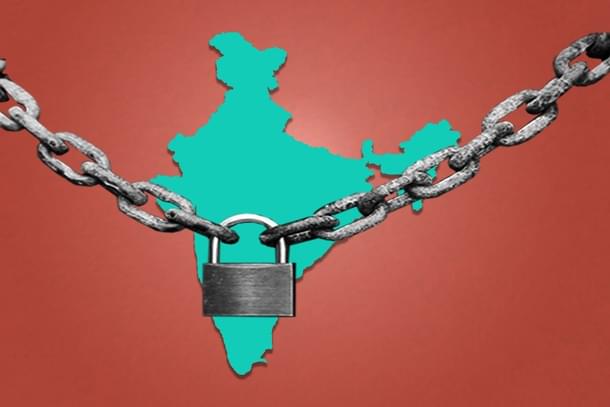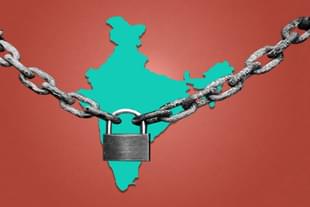Ideas
Six 'Covid-19 Control' Policies That Should Be Strongly Opposed
Amit Thadani
Sep 07, 2021, 03:33 PM | Updated 03:33 PM IST
Save & read from anywhere!
Bookmark stories for easy access on any device or the Swarajya app.


Since the start of the Covid-19 pandemic, there have been several containment policies that have been put into practice. Many of them make very little sense today, given that much more information is available about viral transmission. However, they continue to be used by various state governments in varying degrees.
This article will call out some of the obvious ones that everyone laughs at in private, but doesn't protest against in public. And it is important to write about this, because the livelihood of millions of people is being toyed around in the name of pandemic control, without an iota of proof of that the concerned policies work.
Here are six of them.
1. Occupancy in hotels and restaurants capped at 50 per cent
A residential building can have 100 per cent occupancy but hotels in Maharashtra can have only 50 per cent. A densely packed slum in Mumbai can have ten people in a 100 sq.ft. flat; a 10-room hotel too can have only 100. A roadside eatery can have a swarm of unmasked people around it but a sit-down restaurant with much better facilities can have only 50 per cent of their seats occupied and will be fined Rs.25,000 or more for every violation. At one point, the state government even outlawed home delivery and takeaways from restaurants. The only thing these ridiculously flawed policies have achieved is potentially wiping out as much as 40 per cent of Maharashtra’s hotel and restaurant industry.
2. Restricted timings for businesses
If the same number of people shop daily at a certain number of stores, restricting the timing of the stores will lead to crowding rather than reduction in volumes. But in Maharashtra, not only were timings restricted, half the stores were not allowed to open.
Add to this the classification of businesses into “essential” and “non-essential”, which is basically the government telling most businesses that their existence is not important. It is, for the business owners, their families, their employees and their customers.
3. Malls remain closed
As far back as March 2021, mall owners had submitted a representation to the Maharashtra government that they would follow all the required measures to contain the spread of Covid-19 if they were allowed to reopen. The suggestions were not accepted.
Eventually, malls were permitted to open but a new condition to have the entire staff double-vaccinated put the locks on their doors once again. If roadside vendors, standalone shops and government offices can be allowed to open without such conditions, it is unfathomable as to why this requirement is needed only for mall employees. Also, there is no such requirement for shoppers entering the mall. This is yet another example of unequal application of law to different individuals and businesses.
4. Night curfew
This policy assumes that SARS-CoV-2 is akin to a blood sucking vampire that develops special powers by the night. No, it does not. Keeping people off the streets at times “to prevent congregations” via curfew when most of them are already off the street is just a way for state governments to show “we are doing something” without actually doing anything.
Also read: Unlocking India — the real epidemic numbers
5. Weekend lockdown
This policy virtually assumes that transmission of the virus on weekends is different from that on weekdays. No, it is not. And shopkeepers at most places continue to work anyway from behind closed shutters, they just have to pay a higher “settlement” amount. The idea seems to be to inconvenience people into avoiding any “unnecessary” and “non-essential” shopping. And the government will of course decide whose business is essential and whose is not.
6. Blanket lockdown
I was an early believer in the utility of lockdowns when India had not yet entered the first wave. But by now, there is more than enough reason to accept that blanket lockdowns are ineffective or even counter-productive in the present situation, and more importantly fatal to businesses and livelihood.
I have written earlier as well, that the complete lockdown in Mumbai during the second wave was imposed at a time when numbers had already been falling for a week. Cities that did not impose blanket lockdowns did not fare any different from those that did.
Even the Prime Minister of India stood up and asked states not to impose blanket lockdowns and instead focus on micro-containment zones. But some states like my own still went ahead and did it. The economic devastation due to this is going to push the state and its hapless citizens back by a long way. Many businesses will never reopen.
In the end. . .
Containment measures such as lockdowns can work when the virus is not widespread in community, but not when it has already reached even the remotest parts of the country. The only role of state governments now is to ensure that adequate facilities for hospitalisation are kept ready in the albeit increasingly unlikely event of a large third wave, and to push mass vaccination a step further as a vital measure to reduce the odds of hospitalisation.
I sincerely hope state governments stop playing poker with the lives of their citizens by continuing to push deeply flawed, thoughtless policies. It is high time state governments got down to ensuring two things: one, let the people earn their livelihood that is guaranteed under the constitution without them having to beg and bribe for their own survival; and two, minimise their risks through mass vaccination and healthcare infrastructure development.
This article was first published on Dr Amit Thadani's blog and has been republished here with permission.





